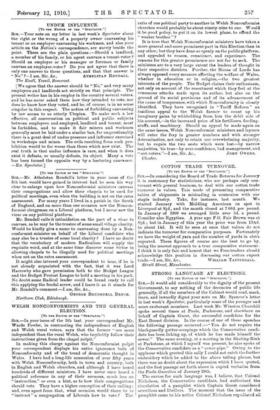WELSH NONCONFORMISTS AND THE GENERAL ELECTION.
[TO THE EDITOR OF THE "SpICTATOR."]
SIR,—In your issue of the 5th inst. your correspondent Mr. Warde Fowler, in contrasting the independence of English and Welsh rural voters, says that the former " are more independent than the rural Welsh, who implicitly follow their instructions given from the chapel pulpit"
In making this charge against the Nonconformist pulpit your correspondent displays his entire ignorance both of Nonconformity and of the trend of democratic thought in Wales. I have had a long-life connexion of over fifty years with Welsh Nonconformity, both in town and country, both in English and Welsh churches, and although I have heard hundreds of different ministers, I have never once heard a political reference in any of their sermons, much less an "instruction," or even a hint, as to how their congregations should vote. They have a higher conception of their calling ; and, even apart from that, what occasion would there be to "instruct" a congregation of Liberals how to vote ? The ratio of one political party to another in Welsh Nonconformist churches would probably be about ninety-nine to one. Would it be good policy, to put it on its lowest plane, to offend the " weaker brother " ?
It is true that Welsh Nonconformist ministers have taken a more general and more prominent part in this Election than in any other; but they have done so openly on the public platform, and appealed to reason, conscience, and experience. The reasons for this greater prominence are not far to seek. The ministers are to a very large extent the leaders of thought in their respective districts. Further, the House of Lords has always opposed every measure affecting the welfare of Wales, whether in education or in religion,—the two greatest interests of the people. The Budget claims their enthusiasm, not only on account of the resentment which they feel at the venomous attacks made upon its author, but also on the ground of its social provisions and of its advancement of the cause of temperance, with which Nonconformity is closely identified. They have recognised in " Tariff Reform " an insidious appeal to the Welsh farmer to count up his imaginary gains by withholding from him the debit side of his account,—in the increased price of his fertilisers, feeding- stuffs, and machinery. Should an appeal be made again on the same issues, Welsh Nonconformist ministers and laymen will enter the fray in greater numbers and with stronger determination, not only to retain our overwhelming majority, but to regain the two seats which were lost—by narrow majorities, 'tis true—by over-confidence, bad management, and










































 Previous page
Previous page